Publication Information
Frequency: Continuous
Format: PDF and HTML
Versions: Online (Open Access)
Year first Published: 2019
Language: English
| Journal Menu |
| Editorial Board |
| Reviewer Board |
| Articles |
| Open Access |
| Special Issue Proposals |
| Guidelines for Authors |
| Guidelines for Editors |
| Guidelines for Reviewers |
| Membership |
| Fee and Guidelines |
 |
INFEL®, the French certification of fruit plants by CTIFL – more than 70 years of expertise!
Fernandez* and S. Ten Have-Lopez
CTIFL – Operational Centre of Balandran, Bellegarde, France
Received Date: October 18, 2023; Accepted Date: October 31, 2023; Published Date: December 07, 2023;
*Corresponding author: A. Fernandez, CTIFL – Operational Centre of Balandran, Bellegarde, France. Email: antoine.fernandez@ctifl.fr
Citation: Fernandez A, Have-Lopez S T (2023) INFEL®, the French certification of fruit plants by CTIFL – more than 70 years of expertise! Adv Agri Horti and Ento: AAHE-186.
DOI: 10.37722/AAHAE.2023302
Abstract
In 2017, a harmonised framework for fruit plant certification has been implemented at European level, based on a European marketing Directive. Following the choice of French nurseries, the CTIFL has renewed the INFEL® certification, the French certification which existed before 2017. This trademark guarantees plants complying with the EU rules and standards for official fruit plant certification, with on top of it higher sanitary and quality standards, defined between French nurseries and the CTIFL.
This project forms part of the traditional search for excellence of French nurseries since 1952. More than 80% of certified fruit plants produced in France are licensed as INFEL®.
The « Centre technique interprofessionnel des fruits et légumes » (CTIFL, technical joint trade centre for fruit and vegetables), is the competent authority in charge of the inspection and certification of fruit plant propagation material in France, except strawberry plants. This certification by filiations guarantees the health status and the trueness to type of the propagated plant material. Inspections and analyses are carried out at each step of plant propagation: from the candidate mother plant to the certified plant. The CTIFL’s laboratory realizes most of the analysis required for the certification. The CTIFL is also in charge of the inspections needed to issue Plant Passports.
Keywords: CTIFL; EU; Fruit plant certification; INFEL®; Label; Nursery
Introduction
Founded in 1952, the Interprofessional Technical Center for Fruits and Vegetables, CTIFL, is the reference for applied research in the French fruit and vegetable sector, from farm to fork. Its main mission is to accompany professionals to meet the challenges of sustainable production and consumer satisfaction in a constantly changing, increasingly competitive and demanding context. It is composed of several operational centers and about fifteen regional stations located in the main French production areas. They carry out experimentation and research programs on the problems identified by the sector and provide technically and economically viable solutions. The CTIFL has a staff of 300 persons and a budget of 28 million Euros 58% financed by voluntary contributions collected by INTERFEL – the Interprofessional Association for Fresh Fruit and Vegetables.
Originally CTIFL was created in 1952 for two purposes:
- the certification of fruit plants (except strawberries) in France. This certification was created by French nurseries in order to ensure the varietal authentication (true to type) of the marketed plants,
- to set up quality standards and a normalization of fruits and vegetables.
The certification later evolved with regulatory requirements and nurserymen’s needs. The requirements of sanitary guarantees were first ensured with the Virus Free (VF) and Virus Tested (VT) certification, terms abandoned in 2017. In France, since 1985, it is an official certification that guarantees the true to type and the sanitary state of the fruit plants.
The nurserymen were the initiators of the fruit plant certification, proof of the seriousness of their work by giving an additional guarantee to their plants. Since its origin, the fruit plant certification is voluntary and has never been mandatory. Today, nearly seventy nurseries in France have signed up to this certification scheme. [Figure 1].
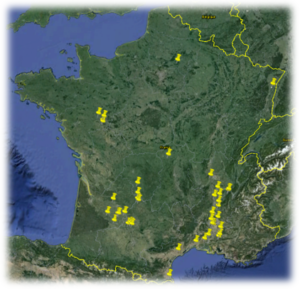
Figure 1: Localization of certified nurseries in France – missing the 8 certified nurseries of Corsica.
When in 2017 the fruit marketing directives for fruit plant propagating material and fruit plants intended for fruit production (2008/90/EU and their implementing directives of 2014, texts transposed into French law) came in force, the profession has decided to maintain a French certification that is more demanding than the European certification. The collaboration of the CTIFL has been requested again by the nurseries. In this context the INFEL® collective mark was registered in 2017.
CTIFL is the Competent Authority for the Certification of fruit plants other than strawberries, named by law on July 19, 2013.
In 2021, CTIFL also became the Competent Authority for the the Phytosanitary Passport for all nurseries accredited to the certification by CTIFL.
The INFEL® certification
INFEL® certification is based on the requirements of the fruit plants certification according to the EU regulations, with additional requirements to ensure a high level of sanitary and varietal quality. Its implementation is the direct consequence of the European harmonization of certification, which establishes a smaller list of harmful organisms than the official French certification before 2017. It also compels for less inspections than the checks carried out by CTIFL in France for many years. A ”race to the bottom” badly perceived by the professionals of the French fruit and vegetable sector.
The idea of being able to label, with the same certification label, any fruit plant grown in France issued from a certified graft or rootstock from another Member State of the European Union was hard to bear for the French nurseries. Hence the idea of establishing a more exhaustive and rigorous certification, or, better to say, keep the high level of the French fruit plant certification in place. To this, it should be added that, with the Dutch NAKTuinbouw Elite® certification, the French certification historically benefits from a strong international recognition. This represents a significant added value for nurseries, thus privileging the quality of plant material as a plus for export sales.
INFEL® gouvernance
INFEL® is a private collective trademark, exclusively owned by CTIFL and registered in 2017. It is governed by a system of shared management with the different actors of the sector, including the nurseries, the representatives of fruit producers and various technical institutions. These actors form with CTIFL the Certification Committee composed of eleven members, each having a deliberative vote. Decisions concerning INFEL® certification are voted by simple majority.
INFEL® calls on a Technical Committee to make proposals for improving the specifications. The Technical Committee is composed of six nurserymen and is led, like the Certification Committee, by the manager of fruit plant certification at CTIFL. The Committees meet at least once a year and more if necessary.
INFEL® specifications
The INFEL® “Regulations of Use” and the “General Rules” are reviewed at least annually by the two committees mentioned above. This allows new relevant requirements to be added relatively quickly or to improve the texts in case of changes in practices. One example: the introduction of rules in the event of the development of new production techniques. However, “compliance with the rules and standards of EU certification” remains the first prerequisite.
INFEL® certification scheme
The technical scheme of INFEL® certification is based on the principle of propagation by filiation of fruit materials (varieties and rootstocks) from a pre basic healthy and authenticated mother plant. [Figure 2].
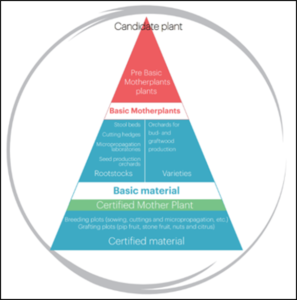
Figure 2: INFEL® certification pyramid.
The main actions of the CTIFL cover the identification of the pre basic candidate mother plants, the sanitary analyses carried out by the CTIFL laboratory, the biomolecular analyses intended to help in the varietal identification, the field controls of all the plants resulting from the filiation and the traceability checks.
These actions are ensured by the three certification units within CTIFL:
- The Conservative Selection: in charge of sanitary testing and conservation of the Pre-Basic Mother Plants of the varieties and rootstocks that the breeders and editors entrust to it. After their multiplication, the pre basic material is supplied to the nurseries accredited to the certification. They continue the multiplication under the control of the CTIFL.
- The Inspection unit: carries out the monitoring and the varietal and sanitary inspections of the material resulting from the conservative selection at the about 70 French nurseries accredited to the certification.
- The Virology and Molecular Biology Laboratory (LVBM): conducts pest detection and biomolecular varietal authentication tests throughout the certification pyramid. The laboratory also is involved in many research projects helping the fruit (plant) sector.
Introduction process for a new cultivar into the INFEL® certification.
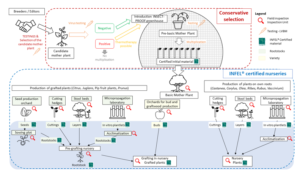
Figure 3: INFEL® certification scheme.
The entry of a new cultivar into the INFEL® certification system [Figure 3] is a rigorous process. First, after agreements between the breeders and/or editors and the CTIFL Conservative Selection, a candidate mother plant is analyzed on epidemic pests and selected. If the analyses prove that the mother plant is healthy, it is placed or grafted in an insect-proof greenhouse. In the case of a viral infection on the mother plant, treatments by thermotherapy are proposed. The pre-basic mother candidate plant, it is maintained, tested on health requirements, and multiplied to produce INFEL® certified initial material.
This initial material [Figure 4] is sent by the CTIFL conservatory selection to certified nurseries in order to produce INFEL® certified plants of this new cultivar, passing through the production of basic mother plants.
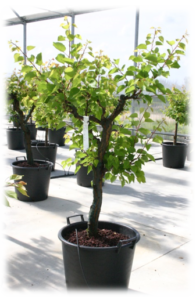
Figure 4: Pre-Basic mother plant in the CTIFL Conservative selection insect-proof greenhouse.
To produce INFEL® certified rootstocks needs for establishing grafted INFEL® certified plants (Citrus, Juglans, Pip fruit plants, Prunus), the basic mother plants serve as seed production orchards, cuttings hedges, stool beds or in-vitro strains. Orchards for bud and graftwood produce INFEL® certified grafts and buds. The grafting or budding of INFEL® certified grafts or buds on a INFEL® certified rootstock allows to obtain an INFEL® certified plant.
To produce INFEL® certified plants on their own roots, not grafted, (Castanea, Corylus, Olea, Ribes, Rubus, Vaccinium), basic mother plants of hedge cuttings, stool beds or in-vitro strains are used.
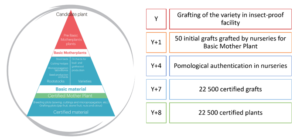
Figure 5: Hypothetical timeline for the introduction of a new cultivar in the INFEL® certification process (assumption: multiplication rate x 50 and 100% success rate).
It’s a long way …
The process of obtaining INFEL® certified plants of a new cultivar can be very long [Figure 5], assuming a hypothetical multiplication rate of 50 and a success rate of 100% at each stage of the multiplication. In the first year, the new cultivar is grafted in the insect-proof greenhouse of the conservatory. The second year, 50 grafts are distributed to the nurseries, allowing them to graft 50 basic mother plants. Four years after the making of the pre basic candidate mother plant, the CTIFL inspection unit proceeds to the pomological checks of the basic mother plants in the nursery. After 7 years, these 50 basic mother plants can give up to 22 500 INFEL® certified grafts which will give 22 500 INFEL® certified plants the following year. Note that the given hypothesis can be much too optimistic as it is species depending.
INFEL® inspections at the Conservative Selection
The true to type and the sanitary guarantee of the certified initial material is ensured by the CTILF’s conservation selection. The French regional NPPO (SRAl Nouvelle Aquitaine) ensures the sanitary audits authorizing the CTIFL delivering the phytosanitary passport, including the PZ-PP ERWIAM (Protected Zone Phytosanitary Passport Erwinia amylovora).
To ensure all guarantees on the basic and certified material at the nurseries, the CTIFL inspection unit carries out numerous field inspections. For each stage of the production of certified plants, the traceability, the true to type and the health state of the plants are inspected. Pomological authentication and, where possible, biomolecular analysis are the tools used by the CTIFL, as well as visual sanitary inspections made by well-trained inspectors completed with asymptomatic and symptomatic sanitary analysis.
Example: Inspections of each stage of the production of grafted Prunus plants at certified nurseries:
Inspections of the seed production orchard [Figure 6].
- Before April: Planting, uprooting and mortality records. Checks of the flowering. Visual health inspections.
- April : Visual health inspections and asymptomatic analysis (1/6 sampling) PDV/PNRSV.
- Summer: Visual health and quality inspections on seed. Labeling and sealing of the seed bags.
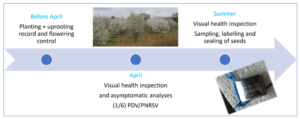
Figure 6: Inspections of the seed production orchard.
Inspections on the cutting hedges and in orchards for bud and graft wood production [Figure 7].
- Before April: Planting, uprooting and mortality records. Visual health inspection.
- May: Visual health inspection, called first PPV tour”.
- June/July: Visual health inspection for all regulated pests, called “second PPV tour.”
- All year around: 1/6 asymptomatic sampling for biological indexing in greenhouses.
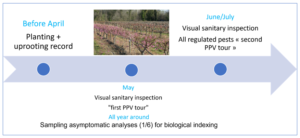
Figure 7: Inspections on the cutting hedges and of orchards for bud and graft wood production.
Inspections of the certified grafted plant production stages [Figure 8].
- Summer Y-1: Sanitary inspections for all regulated pests and true to type checks of the rootstocks in nursery before grafting.
- Summer Y: Sanitary inspections for all regulated pests and true to type checks of the grafted plants.
- Autumn Y: Field control of the labeling and quality control.
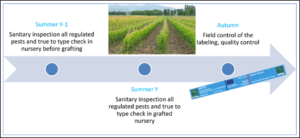
Figure 8: Inspections of the certified grafted plant production stages in nurseries
INFEL® requirements
The main requirements that differentiate INFEL® certification from certification according to EU rules and standards are the following:
- Each new cultivar can be certified INFEL® only if DUS testing has been done by an OCVV accredited DUS test station.
- In-depth audit of the INFEL® certified nursery: inspection of the facilities and the traceability system in place.
- Additional sanitary tests on candidate pre-basic mother plants: non officially regulated pests relevant for fruit production are listed in the INFEL® requirements.
- Restriction of the use of disease sensible rootstocks for grafted basic mother plants.
- Limitation of the life span and number of generations of the basic mother plants.
- Mandatory labeling in the field followed by a visual inspection of the labeling for all INFEL® plants, presence of the label and consistency of the labeling.
- Minimum plant size standards for INFEL® labels.
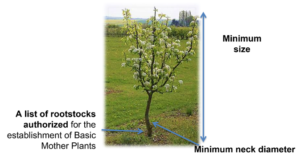
Figure 9: INFEL® quality requirements.
Benefits of INFEL® certification
- High trust from purchasers in France, Europe and third countries: INFEL® certification has an excellent reputation throughout the world.
- The high level of requirements and the high number of tested pests make it easier to export plant material to many third countries.
- Adaptability and reactivity of INFEL® certification: due to its governance system, INFEL® certification can easily and quickly evolve to respond to new issues or opportunities for nurseries and fruitgrowers.
- Maintenance of the inspectors’ expertise: the visual sanitary diagnosis and pomological authentication are essential tools for certification. The large number of field inspections allow the maintenance of the inspectors’ expertise.
- Social acceptation: local production without introduction of non-local pests
- Communication: INFEL® leaflets and other communication material are at the disposal of each INFEL® certified nursery, participation of CTIFL at symposia, CTIFL shares INFEL® expertise in other countries.
Certified species
In 2023, INFEL® certification allows the certification of 18 fruit species:
- 6 Prunus species: apricot, peach, nectarine, cherry, plum and almond
- 3 pip fruit species: apple, pear and quince
- 3 nuts species: walnut, chestnut and hazelnut
- 4 Citrus species: lemon, orange, pomelo and mandarin/clementine
- blueberry
- olive
Other species are in pending certification, such as raspberries, blackberries, currants and blackcurrants.
Some figures of the INFEL® certification (data 2022)
The CTIFL’s INFEL® certification maintains a thousand certified cultivars and 225,000 certified basic mother plants in nurseries, allowing an annual production of 5,4 million certified plants.
INFEL® labels
In compliance with the official EU regulation a Plant Passport is associated at the INFEL® label. Each INFEL® certified plant is labelled with all EU regulatory items completed with a unique label number, the reference to the production plot and the INFEL® logo. [Figure 10].
Figure 10: INFEL® label for basic mother plants and for certified plants.
Equivalence of INFEL® with Dutch NAKTuinbouw ELITE® certification
On the 29th of January 2021, the CTIFL and the NAKTuinbouw certification body signed an equivalence agreement between INFEL® and Dutch NAKTuinbouw ELITE® certification. It was the formalization of a gentlemens’ agreement that had been in place since the end of the XXth century. This bilateral agreement allows, thanks to similar requirements, the transfer of certified plant material between France and the Netherlands with the possibility of maintaining the INFEL® label or the Dutch NAKTuinbouw ELITE® label.
INFEL®, a constantly evolving certification
Thanks to the involvement of all stakeholders INFEL® certification is in constant evolution. It’s open to study the implementation of the best certification process for new species and varieties. It can respond quickly to the demands or needs of the sector thanks to its private character.
Conclusion
INFEL®, the certification of French fruit plants is:
- more than 70 years of expertise
- a shared governance with technical institutions, fruit growers and nurseries
- local production
- a think tank for quick evolutions prior to EU reflection
- a high level of sanitary, true to type and quality guaranty for all fruit plant material making fruit production easier: a good start is half the battle.